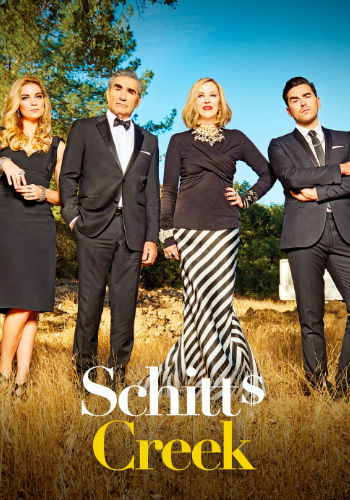
If you were to look at Schitt’s Creek‘s premise in isolation, you might be tempted to wonder if we haven’t been down this folksy, poorly-bitumenised road before.
That’s hardly a crime of course since most TV shows owes some debt of gratitude, large or small, to their broadcast antecedents, and to be fair, if it’s done well, the idea of pampered rich folks ending up living considerably down on their luck in a middle of nowhere, unadorned small town (which they own; it’s their sole remaining asset), can actually prove quite entertaining.
But it hardly screams originality as a lovely little narrative proposition on paper which is why its taken me three years, and a Netflix-subscription to give it the time of day.
The upshot of all this much-delayed viewing, with 39 episodes over three seasons tucked away in the binge-worthy bank, is that the hackneyed premise has been a whole new, uproariously funny lease on life by Eugene and Dan Levy, the father & son team who star in the show as fallen video store magnate Johnny Rose and his pampered son David respectively.
Joined by the inimical Catherine O’Hara as Sunset Boulevard-ish daytime soap actress Moira and Annie Murphy as daughter Alexis who has a thing for rich heirs named Stavros, the Levys, who are joined on the show by Sarah Levy as Twyla Sands, have come up with a fish-out-of-water sitcom that actually generates more than a few laughs per 20 minute running time.
Much of that has to do with the trouble they’ve obviously taken to craft characters who actually make sense; sure they’re trope-heavy to some extent, an almost inevitable outcome given the history of the genre and the needs for oddball personalities to serve the great machine of idiosyncratic comedy; but they’re also real, sweet, genuine people who have a life beyond the next punchline.

Take the Roses themselves.
Johnny is actually a decent, in-touch kinda guy; yes, he’s taken aback by his change in fortune, precipitated by his business manager failing to pay taxes and absconding with all their money to a tax haven somewhere, and wishes things were different, but he’s also grounded enough to realise that he and his family have little choice but to knuckle down and make the most of things.
The rest of the family are not quite so together with Moira convinced that her acting as a spokeswoman for a local fruit wine company may presage a theatrical comeback, one that might derailed by her descents into weirdly disconnected of melancholy and professional regret, David, given to wearing designer clothes and a pansexual, glamorous lifestyle, not quite understanding he may need to work for a living, and Alexis struggling with the idea that her pool of status-climbing would-be husbands has dwindled to the depth of a small pool during the African dry season.
It’s their sense of dislocation and unwillingness to accept their new fate – made all the funnier by Moira constantly riffing on the idea of being in an internment camp or wishing that they all die before they wake up, patent overreactions that reflect how horrified the whole family by their new status in life – that drives much of the humour in the show.
But the Levys, backed by a crack team of writers, have gone to enormous trouble to move the family way beyond the realm of one-trick, oneliner ponies.
As time goes on, it turns Moira, who is not exactly mother of the year, does have a heart and a capacity for adapting, David finds out that perhaps there is a place for him in the most unexpected of places and Alexis discovers that not all her romantic prospects have to own expensive yachts and attend Diddy’s White Parties (in fact, frankly, it’s better if they don’t).
In other words, they’re fleshed out as fully-formed people who have inestimable quirks yes and a burning desire to get back to their old lifestyle but also authentically, realistically human, meaning the humour is less about the same old obvious jokes all the time and more about where the characters take it.
The same applies to almost every other character including mayor Roland Schitt (Chris Elliott; his name delights my inner five year old no end), his high school teacher wife Jocelyn (Jennifer Robertson), motel clerk-then-owner Stevie (Emily Hampshire), the unrequited object of Alexis’s affection Mutt (Tim Rozen) and girlfriend Twyla, and honestly just about everybody of nay note in the show.

This comedy-boosting attention to detailed characterisation pays off bigtime, as does the willingness of Schitt’s Creek to treat everyone with the requisite amount of respect.
So committed to the cause is the show that at one point, when Moira, fresh from getting the same hairstyle of every other woman in town at the local salon, laments once again being in Schitt’s Creek at all.
She’s immediately picked up by Jocelyn who acknowledges that there is a lot the town doesn’t have but that it has a great deal to offer even so and it’s her defense of the show that forces Moira to reconsider her constant carping and explain to Jocelyn why she puts things down so often.
It grounds and humanises both characters, affirms that Schitt’s Creek may be quirky and less-than-ideal in certain ways but that’s still somewhere worth living; neither party is maligned, there’s enough left in the premise to fuel the comedy (which is largely character-driven anyway) and the show moves beyond cheap-and-cheerful set-ups to something far more sophisticated.
And, it must be said, very, very , VERY funny.
If you’ve reached the point with many sitcoms, such as The Big Bang Theory (I love it but it is well past its prime) where your reactions are measured less in uncontrolled guffawing and persistent ringing laughter than the occasional titter and half-baked smile, you’ll delight in the ability of Schitt’s Creek to make you laugh, and laugh hard.
Constantly. Persistently. Episode to exquisitely well-wrought episode.
It rarely drops the comedic baton, takes well-worn narrative and character tropes and spins them in a whole new light, engrossingly hilarious light, gives a damn about the longevity of its characters and understands that good comedy must have some humanity and substances to it if it’s going to have kind of longevity (three seasons and counting).
It’s not always absolutely perfect but what show is, and it gets it rights, and hilariously so, far more than many other sitcoms on air at the moment, proof that you can indeed teach an old genre new tricks and make it funny into the bargain,.